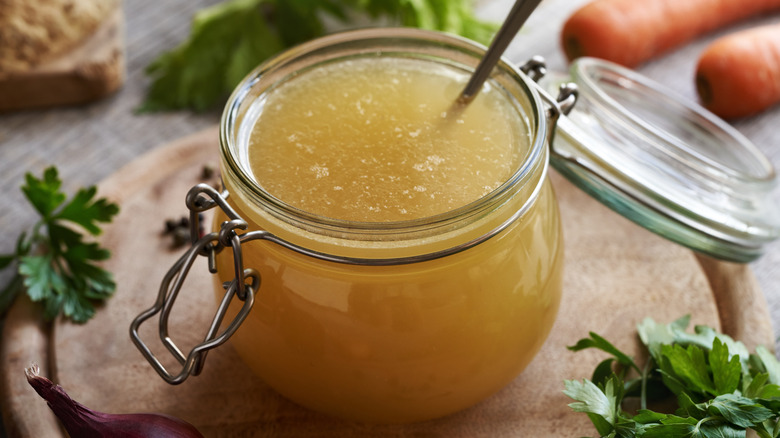How To Substitute For White Wine When Cooking
We mostly think of wine as a delicate drink to sip, but it's a mighty force in cooking food as well. Many recipes call for adding wine because its acidic nature helps to tenderize meat and vegetables, and it adds subtle flavor to savory and sweet dishes. For savory foods, you always want to use a dry wine, in many cases, a dry white wine such as pinot grigio. But what if you don't have any? Don't worry, you can easily swap it out.
You can substitute white wine in cooking with a different alcohol, but you need to be conscious of the alcohol content. The biggest mistake of cooking with wine that many people make is not cooking off all the alcohol. Swapping white wine for a liquor like whiskey or rum would significantly increase the alcohol content, making you more likely to make this error. The best type of alcohol to swap with white wine in cooking would be a light fortified wine.
Fortified wines are wines that have been mixed with a grape-based spirit. There are a few key differences between port and Madeira, two of the best-known varieties, but Madeira is the best choice for a white wine swap. Port is too sweet. You could also use a dry vermouth, another fortified wine that can fill in for white wine in a pinch. If you don't have any of these in your pantry though, you're better off with an alcohol-free swap.
Non-alcoholic substitutes for white wine in cooking
If you don't drink alcohol, there's no reason you should be rushing off to the store to spend your money on a bottle of wine that you'll rarely use. You could use a non-alcoholic wine, if you have any, but it's perfectly fine to swap it out for a completely different, non-alcoholic liquid. There are lots of options available that you probably have in your pantry already. A particularly great swap for white wine in cooking is chicken or vegetable broth. It's a one-to-one substitution that will also add a nice bit of umami to deepen the flavor of your dish. Since most broths have salt in them, you should avoid adding any more salt to the dish until you've added the broth and tasted it.
One last substitute you can try if you don't have any white wine to cook with is white wine vinegar. This is actually made from plain white wine, which has been fermented to become acidic. It shares a similar flavor profile to white wine with the obvious difference being vinegar's pungent sharpness. You can mellow this out by using a 50/50 blend of white wine vinegar and water in place of white wine when you cook. By diluting the vinegar, its harsh acidic notes should fade away, and you shouldn't be able to tell the difference in your final dish.

